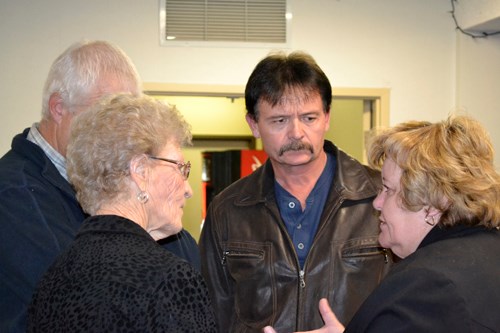"Health care has changed, it always has changed, and it will continue to change,"said John Knoch of Sun Country Health Region at the health authority's Fall 2014 public meeting at the Kenosee Inn Oct. 21, as part of its Community Leadership Network, a series of public meetings designed to inform
residents about health care issues.
The meeting's agenda included presentations on palliative care, advanced care directives, an update on the Lean Management system, conducted by Sun Country CEO, Marga Cugnet, with information about 2014-2015 improvement projects.
Cugnet outlined the region's achievements, challenges, and future plans as they pertain to health care. Upcoming initiatives include: plans for cataract surgeries to be performed at Weyburn General Hospital by a Regina surgeon and for a CT scanner to be installed in Estevan's St. Joseph's Hospital; as well as strategies to improve staff engagement and strategies to reduce mental health wait times for the public.
Sun Country's president and CEO also encouraged: "Everybody, get your flu shots. The province has ordered more flu vaccine, and we encourage everyone to get their shots."
Cugnet also stated that the province is actively preparing for another, far more unlikely virus. "If you would have asked me if I would have ever expected to be talking about Ebola during my career in health care..." said Cugnet. "However, as a region and as a province, we are doing that planning and training. It's very unlikely, but we are doing that training."
During her CEO summary, Cugnet said 2014 highlights from the region included three projects. Twenty-five residents now occupy Radville Health Centre, Kipling's Primary Health Clinic has hired a third physician, and plans are afoot to open the Redvers acute care centre in the near future. In addition, added Cugnet, "Carnduff now has a Primary Health Clinic. With the clinic open there, it means that there are now clinics in both Oxbow and Carnduff."
Cugnet stated that one of the region's ongoing challenges was finding creative, community-based solutions in an effort to retain Emergency Medical Services (EMS) personnel and paramedics in rural areas and also acknowledged the region's working relationship with STARS Air Ambulance.
"We also have two collective agreements that aren't settled-the Saskatchewan Union of Nurses (SUN) and the Health Sciences Association of Saskatchewan (HSAS)," she added.
In addition, Sun Country representatives gave presentations on palliative (end of life) care and advance care planning, giving those gathered information on what to expect from, and where to access palliative care in Saskatchewan, and advising them that the first point of access for palliative care is their nearest home care office.
Palliative co-ordinators Jill Foley and Brenda Freeman responded to questions and stated that "Palliative care addresses the needs of both the patient and their family. Palliative care provides pain management and symptom management," said Freeman. "We prepare [patients] for their symptoms, provide emotional and social support-with depression, anxiety and stress. We also facilitate difficult conversations."
"Palliative care also addresses family and caregiver support. Often, people are struggling and they're worried that they're not giving their loved ones enough care. We have to watch the caregivers or they'll burn out," added Freeman. "Palliative care takes place in the home, in hospitals, in lomg-term care facilities, even in prisons. It's a team effort and encompasses everyone from physicians and nurses to pharmacists, spiritual care workers, occupational care workers, and volunteers."
"Research has shown that people who receive palliative care live about three months longer, have fewer symptoms, have less depression and anxiety, and have a better quality of life," concluded Freeman.
Foley underscored the importance of an Advance Care Plan. "It is what wishes you have regarding your health care when you are unable to speak, for example, CPR, dialysis, a feeding tube, a breathing tube. It's information that is very helpful to your health care team and your family."
In Saskatchewan, anyone over the age of 16 can make an advanced care plan and anyone over 18 can act as an individual's proxy. Foley urged anyone interested in making a plan to consider their choice of proxy carefully. "It doesn't have to be a family member, but if you don't assign a proxy, if a situation comes up where you need one, one will be assigned for you. Also, nothing is set in stone, once you make a plan. It can and should be reevaluated and rewritten at any time and kept up to date."
Sun Country will be adopting the Regina-Qu'Appelle Health Care Region's Advance Care planning tool, 'My Voice', added Foley.
Chris McKee, executive director of the Kaizen Promotion Office (KPO) updated those present on the Lean management system. McKee said that Lean is intended to maximize customer value while minimizing waste. In a short but comprensive review, he outlined many of the projects implemented under Lean and an overview of how the system worked, stressing the health authority's priorities and successes, which include: the design process and construction of Weyburn's Primary Care Clinic, which opened in Feb. 2014 and an emphasis on patient safety, staff input, faster admission times, better use of all resources, and "continuously improving."
Carlyle alderman Martin Tourand was in attendance and said, "Being new on council, it's always good to get new experiences. I came to this meeting so I could find out what was new with the health board, so I could report back to council."
Chairman of the Redvers & District Health Board and Redvers Town Councillor, Mike Garnier agrees. "I think the meeting was very good and very useful. For example, it was good to get a detailed description of Lean, you hear about Lean, but it was helpful to get a detailed description. It was also good to know what's going on in places other than Redvers, such as Kipling's new doctor. It's a good way to find out what's going on in the entire region."




